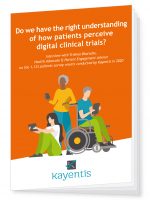The clinical trials industry has been facing numerous and long-lasting challenges of patient recruitment and retention, patient compliance, and clinical trial inefficiency. This has led to a considerable transformation of clinical trials, which has been further accelerated by the COVID-19 pandemic. But why has the decentralization of clinical trials become a ‘must have’?
Because it’s necessary
Decentralization is necessary to decrease patients burden and increase access to clinical trials

With 55% of terminated trials due to low enrollment and 80% of trials requiring timeline extensions or new study sites addition in order to enroll enough patients , there is a huge need to democratize clinical research and make it much more accessible to larger patient populations. Not only does the clinical research industry face this quantitative issue of missing recruitment targets, but it also has to tackle the immense lack of patient diversity. Amongst Americans with cancer participating in clinical trials, only 1% are Hispanic (compared to 17% of the US population overall), 2.8% are Asian and Pacific Islanders (compared to 7% of the US population overall), 5% are Afro-American (compared to 13% of the US population overall). And although non-Hispanic Caucasians do not exceed 60% of the total US population, they represent 80% of clinical trial participants. Today, clinical trials are not conducted in a format that secures full representation of people and their cultural differences . This must change.
FDA promotes enrollment practices that should lead to clinical trials better reflecting the population most likely to use the drug, if approved, and as such issued the Enhancing the Diversity of Clinical Trial Populations — Eligibility Criteria, Enrollment Practices, and Trial Designs Guidance for Industry | FDA guidance. Despite this effort, challenges to participation in clinical trials remain, in addition to the very low efficiency rate of clinical trials: with an average efficiency rate of 11%, clinical trials constitute one of the least efficient industries, and only 1 in 10 drugs passing the strategic step of first in human get to market.
Increasing access to & efficiency of clinical trials must happen – to lead to a reduction of patient burden. As confirmed by patients themselves, one of the main barriers to joining a clinical trial is the logistical burden of following the study protocol procedures. Reducing these barriers is paramount to improving enrollment and retaining patients in the trial. David, multiple sclerosis patient, UK, acknowledged:
“In multiple sclerosis, where you have a severely progressive disease, you might not even want to volunteer for a clinical trial, because of the travel and logistics burden. Digitalization of the research will allow recruitment of more severely [ill] patients or [those] living in remote areas”.
Decentralizing clinical trials means bringing the study to the patient’s environment instead of asking the patient to attend the study center; as such, it is expected that it will significantly decrease the logistical barrier and make clinical trials more practical for participants.
Because it works
Different virtual solutions, complementary to eCOA, have proven their efficacy to make participation in clinical trials less prohibitive and improve participant retention
Data have accumulated showing that decentralization techniques work. They have a positive impact on clinical trial recruitment and efficiency because every aspect of the clinical trial can be covered.

eCOA has proven efficacy, and competing eClinROs, ePROs and eDiaries provide data of much higher quality than paper-based systems. On top of this improved quality, these techniques allow the patients to complete their assessments in the comfort of their own home. The rising adoption of Bring Your Own Device (BYOD) and televisit options will contribute even more to patient comfort during a clinical trial. A recent report showed that hybrid trials, which combine on site visits when procedures are required with remote visits when assessments can be performed virtually, will generate a reduction of 44 to 61% of total study visits, depending on protocols and therapeutic areas.
The rising use of wearables will also create disruption in the way clinical trial data are handled. Direct data streams are faster and free of human error. The huge volumes of interrelated information coming from these devices can be used to form a real-world picture of how a patient is responding to a drug.
eConsent is another interesting avenue as it allows participant consent to be obtained by telephone or televisit with the trial’s principal investigator. Patients could receive documents in advance of their remote visits through digital platforms that permit electronic review and digital signature, and that may even incorporate improved educational components that can support greater comprehension.
Other developments such as investigational drug direct shipment to a patient’s home or local pharmacy have been shown to work. Mobile nursing services that expanded during the COVID-19 crisis allowed a simplified patient experience and reduced the scope of related activities for site staff, through data and sample collection at a participant’s home.
These developments are likely to make participation in clinical trials less prohibitive and improve participant retention.
Because patients want it
Patients and sites are ready for decentralized or hybrid clinical trials
As the COVID-19 pandemic had a significant impact on clinical trial continuity and catalyzed their digitalization, studies were conducted to explore patients’ readiness for using remote technologies and joining decentralized clinical trials.
In our study (1,133 volunteers responded to an 11-question survey between the end of November 2020 and early January 2021), 71% of patients who had already participated in a clinical trial used electronic devices, and more than 85% of them rated their experience with digital tools highly. This finding contradicts the belief that uptake of digital solutions is still very low, and that there’s still reluctance by patients to embrace new technologies. The fact that neither age nor therapeutic area had an impact on this finding suggests that the industry in a good position to further embed the use of digital tools into clinical trials, knowing that there’s already a strong base for success.
This study also showed that 89% of respondents said that they are ready for decentralized or hybrid clinical trials, leaving only 11% preferring traditional on-site clinical trial conduct. As emphasized by Trishna Bharadia, UK Health Advocate & Patient Engagement Advisor,
‘Totally or partially remote trial preference will last. It’s not about having one thing or another. I think it’s about increasing patients’ choice because even outside of COVID, decentralized trials would have suited a lot of people, myself included’.
Regarding the acceptance by clinical trial sites, a rapid shift in the acceptance of virtual solutions seems to have occurred. A WCGClinical report indicates that most trial sites will continue with decentralized trials after the pandemic: 73% of sites plan to use remote coordinators (vs. 12% prior to the pandemic), and 61% plan to use telemedicine (vs. 15% prior to the pandemic).
Decentralized and hybrid clinical trials will become the new normal. Because improved enrollment and retention of clinical trial participants and the overall efficiency of clinical trials are vital and overdue, because technology has evolved in such a way that makes decentralization possible, and even more because the patients who generously contribute to clinical research are ready for it, clinical trial decentralization can only happen – now.
Discover the key considerations for the implementation of successful Decentralized Clinical Trials
Learn more:










